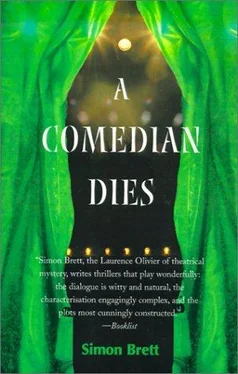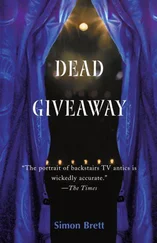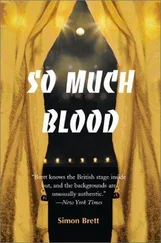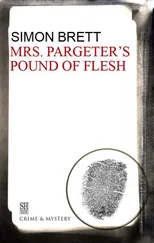Simon Brett - A Comedian Dies
Здесь есть возможность читать онлайн «Simon Brett - A Comedian Dies» весь текст электронной книги совершенно бесплатно (целиком полную версию без сокращений). В некоторых случаях можно слушать аудио, скачать через торрент в формате fb2 и присутствует краткое содержание. Жанр: Классический детектив, на английском языке. Описание произведения, (предисловие) а так же отзывы посетителей доступны на портале библиотеки ЛибКат.
- Название:A Comedian Dies
- Автор:
- Жанр:
- Год:неизвестен
- ISBN:нет данных
- Рейтинг книги:5 / 5. Голосов: 1
-
Избранное:Добавить в избранное
- Отзывы:
-
Ваша оценка:
- 100
- 1
- 2
- 3
- 4
- 5
A Comedian Dies: краткое содержание, описание и аннотация
Предлагаем к чтению аннотацию, описание, краткое содержание или предисловие (зависит от того, что написал сам автор книги «A Comedian Dies»). Если вы не нашли необходимую информацию о книге — напишите в комментариях, мы постараемся отыскать её.
A Comedian Dies — читать онлайн бесплатно полную книгу (весь текст) целиком
Ниже представлен текст книги, разбитый по страницам. Система сохранения места последней прочитанной страницы, позволяет с удобством читать онлайн бесплатно книгу «A Comedian Dies», без необходимости каждый раз заново искать на чём Вы остановились. Поставьте закладку, и сможете в любой момент перейти на страницу, на которой закончили чтение.
Интервал:
Закладка:
From his vantage point Charles could see both sides of Barber’s entry. The reeling approach behind the flats (for the benefit of the producer’s coronary and the dishy researcher’s hot flushes) and the upright dignified appearance on camera (for the benefit of the viewing public).
The studio audience’s applause was surprisingly warm. In spite of the changes time had wrought, they still found Lennie Barber comfortingly familiar, like cups of Ovaltine and ration books and tram tickets and suspender belts, a link with a simpler time.
But it was clear as Alexander Harvey came in over the applause that he was out for blood. ‘Now, Lennie, you’re a comedian, you have been one all your life, you must have thought a lot about the nature of comedy, so tell me. .’ He paused ingenuously. It was clever. He was going to get the comedian to talk about the nature of comedy, knowing that analysis of humour reduces intelligent people to incoherent wafflers and brilliant comedians to unfunny bores. This was an ideal start for the Alexander Harvey method. His victim was bound to go on at inordinate length, until an incisive interruption from Harvey would point up his long-windedness. The question was poised delicately in the air. ‘What makes a joke funny?’
‘An audience laughing at it,’ Lennie Barber replied immediately, and by doing so, proved that he had just made a joke. The audience laughed. The line itself wasn’t funny, but Barber’s speed of delivery and obvious contempt for the question, coupled with Harvey’s expression of surprise, made it a very funny moment.
Alexander Harvey was disconcerted to the point of looking at the notes on his clipboard (something which usually happened much later into one of his interviews). He had to come in quickly with another question. The longer the break after Barber’s reply, the longer the comedian’s triumph. But Harvey was a professional and he shaped his next question skilfully. He asked something which would make Barber define his own success or failure. ‘You’ve been a comedian all your life and comedy is a notoriously insecure profession. One day you’re on top, the next nobody wants to know about you. When in your career did you feel really confident that you had made it?’
‘Tuesday nights mostly.’ Again the response was perfectly timed and the audience picked up the sexual innuendo instantly.
Alexander Harvey’s mouth hardened into a little line of petulance. These short answers may have been to the audience’s taste, but they made it difficult for him to impose his own rhythm on the interview. He decided to slow the proceedings down and reassert control with a longer question.
‘One thing I must ask you — we hear constantly about the issues of censorship and permissiveness.’ (He was trying to steer Barber into an area of serious discussion where the comedian would show himself up as trivial.) ‘Now, the traditions of the music hall are very robust, even vulgar — I suppose I’m thinking of people like Marie Lloyd, Max Miller. When you were in the double act with Wilkie Pole, your material was very clean, but now that a lot of the taboos are down and you are still working in the comedy field, how do you view sex?’
‘Through binoculars.’ Prompt again, right on cue. Alexander Harvey was being reduced to the level of a feed and the more he tried to take control, the more he set himself up.
He laughed insincerely and pressed on with his next question as if this badinage was all very well, but not really what the public had switched on to see. ‘Now, Lennie, there’s a cliche around that comedians are pretty pathetic people offstage.’
‘Some of them are pretty pathetic on-stage.’ The audience roared again.
‘I mean that, as in the example of Pagliacci,’ (hoping to show Barber up by abstruse reference) ‘clowns are essentially tragic figures — do you subscribe to this view?’
‘I don’t know. What’s the subscription?’ (Laughter.)
‘What I mean is that comedians yearn to be taken seriously. For instance, they’re supposed to have aspirations towards the legitimate theatre. Do you want to play Hamlet?’
‘What at?’ (Laughter.)
‘Ha, ha, very good. Perhaps we could move on to television. I mean, here you are, a comedian brought up through the tough school of the music hall, which is now dead, and here we are on today’s medium, television. It has been said that music hall died and television was the box they put it in — do you agree with that?’
‘What, that people on television are dead?’ (Laughter.)
‘No, no.’
‘I’m sorry. I’ve been watching too many chat-shows.’ (Laughter and applause.)
‘Yes. I’m sorry. I was trying to ask a serious question.’ Harvey sounded as piqued as the local favourite beaten for the Women’s Institute Flower Arranging Trophy by a complete novice. ‘Let me try another tack. It always seems to me that it must be difficult for a comedian to have any dignity. I. . er. .’
Alexander Harvey paused for a second, apparently perplexed. He could see the Floor Manager beyond the circle of light gesturing at him. The man was circling his hand in the accepted ‘wind-up’ signal. Time to bring the chat to an end. What threw Alexander Harvey was that, though he had seen the signal any number of times, he had never actually seen it while he was talking. It was usually while some nonagenarian flautist was telling a rambling tale about Sir Thomas Beecham. But now it was being directed at him. His confusion came with the realization that he was the one who was being boring, that he was the one whom the director was no doubt vilifying in the control room. He stumbled in his sentence and then picked up momentum with an edge of bitchiness. ‘Um, Marty Feldman once said that comedy was an unnatural act — would you agree?’
‘Would I agree to an unnatural act? Is that a proposition?’ asked Lennie Barber coolly and perfectly. The audience erupted into laughter and applause. Barber’s riposte had struck a chord in all of them. Not only had it been rude to a man whom at bottom they hated; it had also reflected their own suspicions about his sexual identity.
Alexander Harvey, a fixedly indulgent smile on his face, hastily gestured at his guest, to make it look as if he was cueing the applause rather than letting it arise spontaneously. But the gesture was too late. There was no doubt that, at the end of the contest, Lennie Barber had won by a knockout.
Alexander Harvey linked ungraciously into the sketch, but he could no longer do any harm. Snide remarks about ‘the sort of comedy that used to be popular in the late thirties’ could not weaken Barber’s hold on his audience. And the omission of Charles Paris’ name from his introduction was unlikely to worry anyone except Frances (bound to be watching), Maurice Skellern (possibly ill with excitement at the thought of one of his clients actually being in work) and, of course, Charles himself.
After the interview, the sketch could not fail. The script was really pretty limp stuff, containing every old barbershop joke that ever groaned into life. But audiences like old jokes, and Lennie Barber was the hero of the hour. Apart from that, he rose above his material. Charles, as he went through his automation acting routine (Bepardon? — 1–2 — 3 — Bepardon?’) found his respect for the comedian soaring. Lennie Barber was right; he did know how comedy worked.
The set-up of the sketch was simple. Barber, in a hastily-assumed white coat, was the barber. Wilkie Pole was a gormless North Country youth who was about to meet his girl and wanted a quick hair-cut and shave ‘so’s I look me best, like, for me little girlie — 1–2 — (Bashful simper).’ Barber, having offered him ‘hair-cuts, hair-brushes, hair-combs, hair-oil, hair-tonic, hair-restorer — sounds like a German picnic, doesn’t it?’ sat him in the chair and proceeded to hack away at the special wig on his head, keeping up a running stream of gags the while. When the wig was reduced to a haystack he started on the shaving. He kept cutting his client’s chin (‘Only a little nick, sir’) and putting pieces of paper on the cuts. Pole left the shop with his face a mass of confetti and his hair in shreds.
Читать дальшеИнтервал:
Закладка:
Похожие книги на «A Comedian Dies»
Представляем Вашему вниманию похожие книги на «A Comedian Dies» списком для выбора. Мы отобрали схожую по названию и смыслу литературу в надежде предоставить читателям больше вариантов отыскать новые, интересные, ещё непрочитанные произведения.
Обсуждение, отзывы о книге «A Comedian Dies» и просто собственные мнения читателей. Оставьте ваши комментарии, напишите, что Вы думаете о произведении, его смысле или главных героях. Укажите что конкретно понравилось, а что нет, и почему Вы так считаете.












